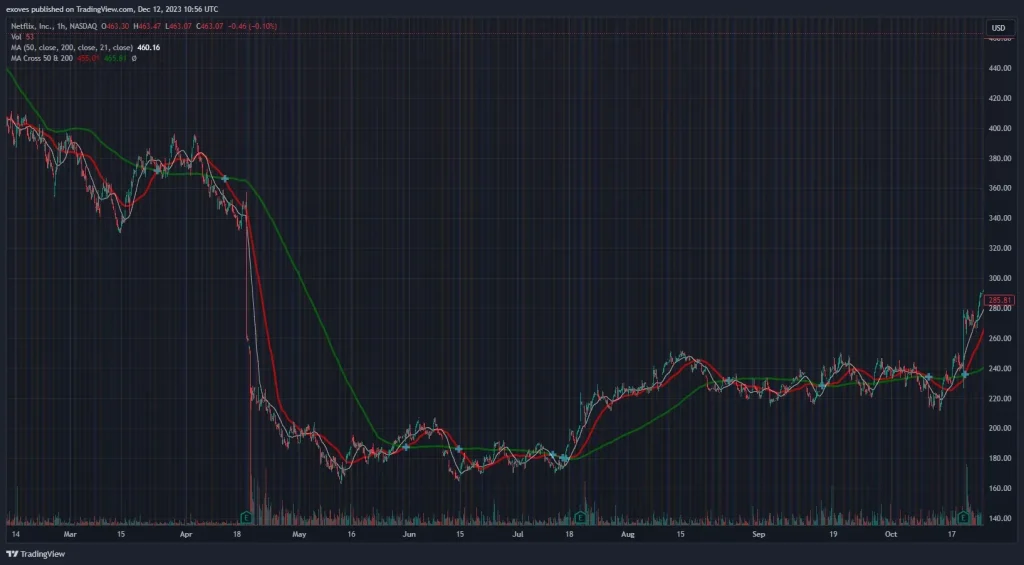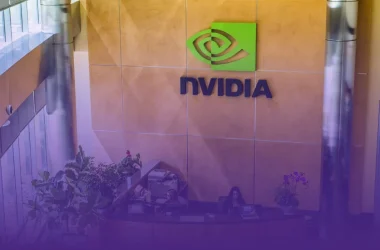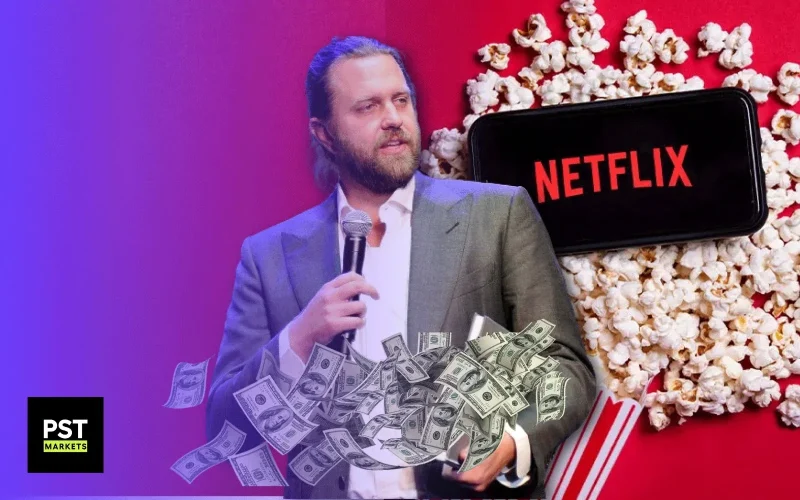Throwing $55 million down the drain is crazy – nobody would ever do this, no matter how rich they are. But shockingly, Netflix did just that when it gave $55 million to Carl Erik Rinsch to direct a sci-fi series that never saw the light of day. Investors in NFLX stock are probably smarting from this story of horrible oversight and management.
Now we know that Rinsch didn’t really use all of the $55 million for the production of the show he promised. Instead, he bet $11 million on stock market options. And to no one’s surprise, his bet failed.
But what is surprising, is the fact that Rinsch recovered and bet whatever was left from the $11 million on crypto. More specifically on Dogecoin. Luckily for him, this time, his investment became worth $27 million less than a year later.
While this is a crazy store that might be fun tp tell your friends at the bar, it should have a very different affect on Netflix’s shareholders. If Rinsch was able to do all of this with Netflix’s money, what else could be happening behind the scenes? And more importantly, could this mishandling of production funds hurt NFLX stock in the future?
Netflix & Carl Rinsch
In late November, a New York Times expose revealed how director Carl Rinsch basically scammed Netflix for $55 million for a TV show he might never have planned on completing.
It all started in 2018, near the height of the streaming boom. At the time, Rinsch and his then-wife Gabriela Roses Bentancor were working on a sci-fi series. But they needed funding to start the project. They began pitching their idea to studios hoping to get picked up for a season.
At the time streaming was gaining steam, and streaming platforms were desperate for content. This was also right after Rinsh’s success directing 47 Ronin starring Keanu Revees. So naturally, Rinsch’s project started a bidding war with half a dozen studios and streaming platforms trying to nab the project.
After the competitive auction, Rinsch reached an informal eight-figure agreement with Amazon. But Netflix swooped in at the last second and offered Rinsch millions of dollars more and sweetened the deal by offering something studios rarely give directors—the final cut. With that, Netflix won the bidding war and agreed to pay $61.2 million for the rights to the series.
This was a big win for Rinsch since final cut is usually only granted to established directors who make money for their producers. Legendary directors like Steven Spielberg, James Cameron, and Quentin Tarantino are granted this privilege, but Rinsch wasn’t and still isn’t anywhere near the stature of these legendary directors.
47 Ronin
The thing is, Rinsch’s only experience was directing 47 Ronin – which was a complete bomb at the box office. In fact, it’s considered one of Keanu Reeves’ worst movies to date, with a very poor critical reception. In addition to 47 Ronin’s lackluster performance, during its production Rinsch clashed with one of the movie’s producers, Scott Stubber, so much that he was even removed from the editing room.
After Ronin 47 flopped, Rinsch went back to making commercials. But on the side, he and his then-wife Roses began working on a passion project; a sci-fi series called “White Horse” which Netflix eventually bought.
At first, Rinsch financed the production with his own money and just like with Ronin 47, there were many problems during production. During a shoot in Kenya, Rinsch insisted on filming for 24 hours straight. And in Romania, the leading actress caught hypothermia doing a scene barelegged in the snow and had to be rushed to a hospital.
But still, Rinsch successfully secured funding from 30West, a production company backed by billionaire Dan Friedkin. However, the whole show was in jeopardy when 30West threatened to take possession of the project after Rinsch missed a production deadline.
Keanu Reeves Steps In
Luckily for Rinsch, Keanu Reeves intervened and agreed to invest in the project and become a producer. With the money Reeves contributed, Rinsch finished editing six short episodes to pitch to the big streaming platforms. Since Netflix viewed the project as a potential sci-fi franchise similar to Stranger Things, it swooped in at the last minute and renamed it “Conquest.”
In doing so, Netflix granted Rinsch generous terms and thereby ignored several glaringly obvious red flags. The first red flag was the project’s past. At the time, Rinsch was fighting with 30West and some other early investors who, under a legal settlement, received $14 million from the $61 million Netflix paid. The second red flag, was so obvious that its shocking Netflix overlooked it: the series still didn’t have a complete script.
But even that doesn’t come close to Netflix completely overlooking Rinsch’s checkered past. The streaming platform even failed to consult Stubber who was working in Netflix’s movie division. If they had, they would have heard about the clashes between them during production of Ronin 47. That’s pretty bad management.
Conquest
With all those red flags, Conquest was set up to fail from the beginning. Problems with production started right after Rinsch got the funding. Rinsch’s behavior grew erratic and he even claimed to have discovered Covid’s secret transmission mechanism and that he could predict lightning strikes.
More importantly, though, Rinsch missed many production milestones. He was also toggling between 2 versions of the script, a shorter one that matched the original 13-episode plan and one twice as long that would’ve required greenlighting a second season.
Despite all of this, Rinsch asked Netflix to send him more money and Netflix responded by wiring him $11 million more for his show. Now Netflix had given Rinsch $55 million without even having 1 episode to show for it.
Risky Options Trading
Rather than use the $11 million to work on the project, Rinsch immediately transferred $10.5 million to his personal Charles Schwab brokerage account and in a matter of weeks, he lost $5.9 million from risky options trading.
It makes perfect sense that someone who thinks they can predict lightning strikes and the transmission of Covid would also think they can trade options. For most people losing $5.9 million would have been a wake up call, but even this was not enough for Rinsch.
Dogecoin
He transferred what remained of the $11 million to a Kraken account where he placed bets on Dogecoin. Luckily for Rinsch, his investment netted him $27 million after he liquidated his Dogecoin positions in May 2021.
During that time, Rinsch was in the middle of a divorce lawsuit. So he went on a spending spree to hide his crypto winnings, according to Roses’ legal team. Rinsch bought 5 Rolls Royces, a Ferrari, and high end furniture and designer clothing, all worth around $8.7 million.
Rinsch contested that the cars and furniture were props for Conquest and were paid for with Netflix’s production money so that Roses wouldn’t get any of them during the divorce trial. But Rinsch’s stance changed, and sued Netflix for owing him payments totaling more than $14 million, arguing that the money was contractually his.
Netflix disagrees with Rinsch’s stance and claims in a motion it filed in July that the payments were contingent on Rinsch hitting several production milestones, which he never did. As of now, the case went to a hearing before an arbitrator in November, and a ruling is expected soon.
This whole fiasco gives us a quick peek under the hood of the Netflix streaming machine, and the picture is not great. This scandal clearly shows us that Netflix has failed at one of the most important business aspects—risk management.
What this Means for NFLX Stock…
Netflix saw 47 Ronin’s massive failure, yet they still signed Rinsch for an 8 figure deal. What’s even worse is that Netflix sent Rinsch another $11 million, to a director who was already way over budget without any financial controls.
Netflix didn’t even wire the money to a joint account so that it could oversee the spending. This screams glaring oversight, which could lead to a shareholder exodus if they start losing faith in the company’s ability to manage their risks.
This also raises a legitimate question, if Netflix can afford to waste $55 million on a project without even getting 1 full episode, why does it keep raising its subscription prices?
Netflix Subscription Pricing
When Netflix reported its Q3 earnings last October, it also announced that it was increasing prices on its basic and premium plans. Now, basic plan subscribers will pay $11.99 per month instead of $9.99, and premium plan subscribers will pay $22.99 per month instead of $19.99. However, Netflix kept its ad-supported plan at $6.99 and its standard plan at $15.49.
This isn’t the first time Netflix has raised its subscriptions though. Back in 2014, the standard plan cost $8.99 per month and the premium plan was priced at $11.99. Then in 2019, these prices were $12.99 and $15.99. So the recent increase may not go well with Netflix’s subscribers when they know that it can afford to lose money on failed projects.
In fact, Americans are already fed up with Netflix’s increasing prices. Almost 40% of American Netflix subscribers plan to cancel their subscription due to increased prices. And a survey conducted by Civic Science found that nearly 2 thirds of American Netflix subscribers are contemplating canceling their subscription or switching to a cheaper ad-supported plan.
NFLX Stock Forecast
Now North America is Netflix’s second largest market and having 2 thirds of its US subscribers cancel their subscriptions or switch to the cheaper ad-supported plan would certainly harm Netflix’s profitability.

In April 2022 NFLX stock plummeted 67% after losing subscribers in Q1. If Netflix’s subscriber growth is in the negative due to the recent hike, NFLX stock might drop again after its Q4 earnings in January.
Aside from the price increases and potential loss of customers, NFLX could face retribution from its shareholders for its handling of funds. For a long time, NFLX was content throwing money at any project but has faced backlash for its woke programming. Now that it is clawing its way back by returning to popular programs NFLX stock has recovered. But this doesn’t mean that stories like this one will calm Netflix shareholders.
Management’s mishandling of Rinsch and Conquest is cause for concern, but the fact that this is likely just one of many similar stories should set off alarms for investors. Netflix’s flagrant disregard for basic oversight and risk management
Disclaimer
Please visit and read our disclaimer here.









